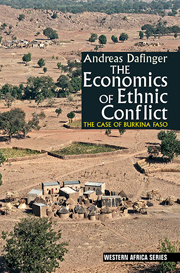Book contents
- Frontmatter
- Contents
- List of Maps
- List of Figures and Tables
- List of Acronyms
- List of Vernacular Expressions
- Acknowledgements
- Dedication
- 1 Introduction
- 2 The logic of global relations: Burkina Faso, Boulgou and the world
- 3 Sharing the land: The ethnic division of labour
- 4 Conflict
- 5 Concealed economies: The hidden dimension of conflict and cooperation
- 6 Conclusion
- References
- Index
1 - Introduction
Published online by Cambridge University Press: 05 October 2013
- Frontmatter
- Contents
- List of Maps
- List of Figures and Tables
- List of Acronyms
- List of Vernacular Expressions
- Acknowledgements
- Dedication
- 1 Introduction
- 2 The logic of global relations: Burkina Faso, Boulgou and the world
- 3 Sharing the land: The ethnic division of labour
- 4 Conflict
- 5 Concealed economies: The hidden dimension of conflict and cooperation
- 6 Conclusion
- References
- Index
Summary
In the two decades since the end of the cold war the world has seen a profound change in the way conflicts are perceived. Conflicts appear smaller in scale, larger in number, and more local in scope. Having lost the support of a clear-cut world order, public perception and the media have had to find ways of explaining and categorizing these new conflicts, which were often no longer wars between nation states or national alliances. Conflicts are often perceived as directed against the state and most violence as insurgencies against the state's monopoly of warfare, power and jurisdiction. Wars are led by groups that are often, despite more appropriate terms, considered ‘ethnic’, and the new category, ‘ethnic conflicts’, has become a catch-all term to include most clashes on sub-national levels.
This book presents a series of case studies from Burkina Faso to show that this is not merely a process of global (re-)classification, but that the change of rhetoric has begun to reshape social relations on the ground, impact upon political strategies and affect local production patterns. As national and developmental organizations refute ethnic criteria, ‘non-ethnicity’ has become a key factor in defining civic entitlements and political participation. Ethnic groups, ethnically defined tensions and resource competition stand as synonyms for the pre-modern, under-developed and unruly and offer legitimate frames for political and judicial intervention. At the same time, local groups, elites and individuals appropriate the discourse over ethnicity when dealing with the state (and with development and other NGOs) in order to secure scarce resources under pressure from population growth and climate change.
- Type
- Chapter
- Information
- The Economics of Ethnic ConflictThe Case of Burkina Faso, pp. 1 - 22Publisher: Boydell & BrewerPrint publication year: 2013



